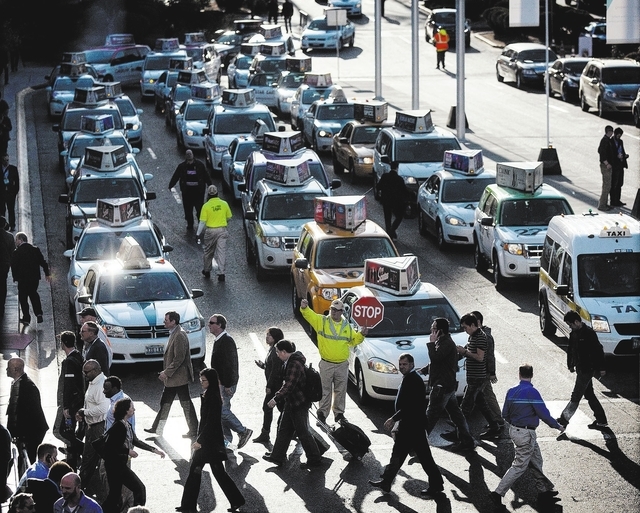Taxi-hailing app Uber bucks existing regulations

Disruptive technologies challenge the status quo.
If there were a poster child for disruptive technology at International CES, it was Uber, a car-for-hire app that connects ride-seekers to drivers.
During the consumer electronics convention, the San Francisco-based startup launched a Twitter campaign, #VegasNeedsUber, to rally against Nevada’s transportation regulations.
The campaign illustrates how new technology can clash with existing law.
Uber is available in 60 cities in 26 countries worldwide but said it can’t operate in Las Vegas because Nevada Administrative Code requires charter services, such as limousines and town cars, to charge by the hour for a minimum of one hour.
Uber uses a smartphone’s GPS to detect a user’s locations and match them with drivers, including taxis, town cars and everyday commuters. Users can input pickup and drop-off locations to get fare quotes and pay using the app.
Most drivers who use Uber own their own cars or work for limo companies.
Andrew Noyes, public policy and communications representative at Uber, called Nevada regulations protectionist, in place to shield the taxi industry. He said Uber has faced similar challenges in Miami, Houston and Portland, Ore.
“Regulations mandating a one-hour minimum time limit and one-hour minimum fare (averaging $46) for town cars, regardless of the actual time or distance of your ride, are bad for consumers, bad for competition and stifle much-needed innovation among Las Vegas transportation providers,” an Uber blog post read.
Cabdrivers disagree.
Sam Moffit, cabdriver with Yellow Checker Star and steward of the ITPE Union, said most cabdrivers oppose it.
In Nevada, taxis are company-owned and drivers can’t work for themselves, and ride-sharing isn’t regulated.
“It’s not fair to someone who is working for a living, trying to make a living, and here comes some guy that might be working a 9 to 5 job or whatever, and he’s doing this in his spare time and he’s taking money off your table while he’s doing it,” Moffit said.
Nevada Transportation Authority Chairman Andrew MacKay said though statutes might not fit their business model, Uber is allowed to operate in Nevada.
“It’s like anything, both from a regulatory or a statutory standpoint,” said MacKay. “If there are laws that they think need to be changed, there are processes involved.”
Dominic Paschel, vice president of Pandora Internet Radio and an attendee at CES, sympathizes with Uber.
“Our plight is very similar in the sense of laws not keeping pace with innovation and technology,” Paschel said.
In the past, Pandora has organized customers to rally and persuade Congress not to raise music royalty rates.
Paschel said Pandora pays 25 percent of all global radio royalties, while broadcast radio pays no performance royalty.
“Technology is, to some degree, being biased against,” he said. Even though we’re providing a better experience than broadcast radio — we’re allowing to personalize music to your tastes — we’re being, to some degree, penalized.”
Contact reporter Kristy Totten at ktotten@reviewjournal.com or 702-477-3809. Follow @kristy_tea on Twitter.